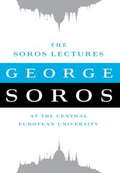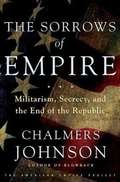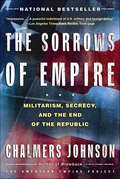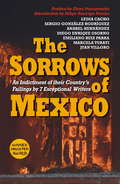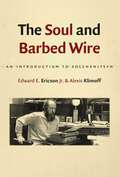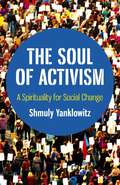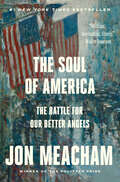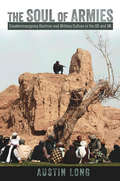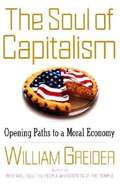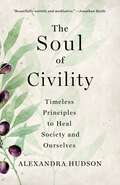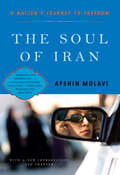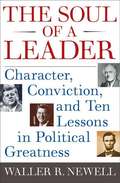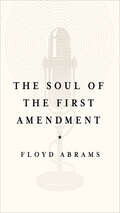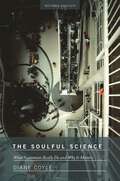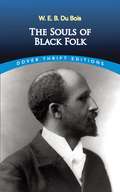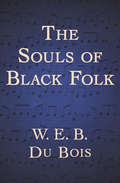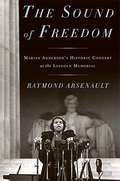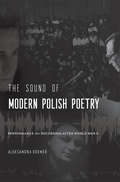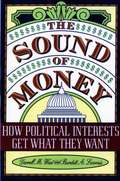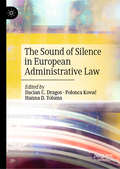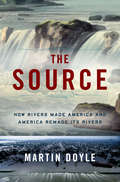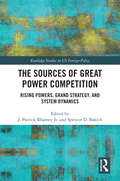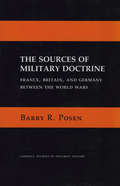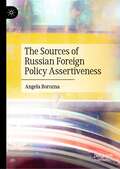- Table View
- List View
The Soros Lectures: At the Central European University
by George SorosFive lectures George Soros recently delivered at the Central European University in Budapest - which he founded in 1991 - distill a lifetime of thinking on finance, capitalism and open society In a series of lectures delivered at the Central European University in October 2009, George Soros provided a broad overview of his thoughts on economics and politics. The lectures are the culmination of a lifetime of practical and philosophical reflection. In the first and second lecture, Soros discusses his general theory of reflexivity and its application to financial markets, providing insight into the recent financial crisis. The third and fourth lectures examine the concept of open society, which has guided Soros' global philanthropy, as well as the potential for conflict between capitalism and open society. The closing lecture focuses on the way ahead, closely examining the increasingly important economic and political role that China will play in the future. The Budapest Lectures presents these five seminal talks into one volume, which offers a condensed and highly readable summary of Soros' world view.
The Sorrows of Empire: Militarism, Secrecy and the End of the Republic
by Chalmers Johnson[From the book jacket] In the years after the Soviet Union imploded, the United States was described first as the globe's "lone superpower," then as a "reluctant sheriff," next as the "indispensable nation," and, in the wake of 9/11, as a "New Rome." Here, Chalmers Johnson thoroughly explores the new militarism that is transforming America and compelling its people to pick up the burden of empire. Reminding us of the classic warnings against militarism-from George Washington's Farewell Address to Dwight Eisenhower's denunciation of the military-industrial complex-Johnson uncovers its roots deep in our past. Turning to the present, he maps America's expanding empire of military bases and the vast web of services that support them. He offers a vivid look at the new caste of professional militarists who have infiltrated multiple branches of government, who classify as "secret" everything they do, and for whom the manipulation of the military budget is of vital interest. Among Johnson's provocative conclusions is that American militarism is already putting an end to the age of globalization, and bankrupting the United States even as it creates the conditions for a new century of virulent blowback. The Sorrows of Empire suggests that the former American republic has already crossed its Rubicon-with the Pentagon in the lead.
The Sorrows of Empire: Militarism, Secrecy, and the End of the Republic (The American Empire Project)
by Chalmers JohnsonFrom the author of the prophetic national bestseller Blowback, a startling look at militarism, American style, and its consequences abroad and at home In the years after the Soviet Union imploded, the United States was described first as the globe's "lone superpower," then as a "reluctant sheriff," next as the "indispensable nation," and now, in the wake of 9/11, as a "New Rome." Here, Chalmers Johnson thoroughly explores the new militarism that is transforming America and compelling its people to pick up the burden of empire.Reminding us of the classic warnings against militarism—from George Washington's farewell address to Dwight Eisenhower's denunciation of the military-industrial complex—Johnson uncovers its roots deep in our past. Turning to the present, he maps America's expanding empire of military bases and the vast web of services that supports them. He offers a vivid look at the new caste of professional warriors who have infiltrated multiple branches of government, who classify as "secret" everything they do, and for whom the manipulation of the military budget is of vital interest. Among Johnson's provocative conclusions is that American militarism is putting an end to the age of globalization and bankrupting the United States, even as it creates the conditions for a new century of virulent blowback. The Sorrows of Empire suggests that the former American republic has already crossed its Rubicon—with the Pentagon leading the way.
The Sorrows of Mexico
by Elena Poniatowska Diego Enrique Osorno Lydia Cacho Anabel Hernández Juan Villoro Emiliano Ruiz Parra Marcela Turati Sergio González RodríguezWith contributions from seven of Mexico's finest journalists, this is reportage at its bravest and most necessary - it has the power to change the world's view of their country, and by the force of its truth, to start to heal the country's many sorrows.Supported the Arts Council Grant's for the Arts Programme and by PEN PromotesVeering between carnival and apocalypse, Mexico has in the last ten years become the epicentre of the international drug trade. The so-called "war on drugs" has been a brutal and chaotic failure (more than 160,000 lives have been lost). The drug cartels and the forces of law and order are often in collusion, corruption is everywhere. Life is cheap and inconvenient people - the poor, the unlucky, the honest or the inquisitive - can be "disappeared" leaving not a trace behind (in September 2015, more than 26,798 were officially registered as "not located"). Yet people in all walks of life have refused to give up. Diego Enrique Osorno and Juan Villoro tell stories of teenage prostitution and Mexico's street children. Anabel Hernández and Emiliano Ruiz Parra give chilling accounts of the "disappearance" of forty-three students and the murder of a self-educated land lawyer. Sergio González Rodríguez and Marcela Turati dissect the impact of the violence on the victims and those left behind, while Lydia Cacho contributes a journal of what it is like to live every day of your life under threat of death. Reading these accounts we begin to understand the true nature of the meltdown of democracy, obscured by lurid headlines, and the sheer physical and intellectual courage needed to oppose it.
The Sorrows of Mexico
by Elena Poniatowska Diego Enrique Osorno Lydia Cacho Anabel Hernández Juan Villoro Emiliano Ruiz Parra Marcela Turati Sergio González RodríguezWith contributions from seven of Mexico's finest journalists, this is reportage at its bravest and most necessary - it has the power to change the world's view of their country, and by the force of its truth, to start to heal the country's many sorrows.Supported the Arts Council Grant's for the Arts Programme and by PEN PromotesVeering between carnival and apocalypse, Mexico has in the last ten years become the epicentre of the international drug trade. The so-called "war on drugs" has been a brutal and chaotic failure (more than 160,000 lives have been lost). The drug cartels and the forces of law and order are often in collusion, corruption is everywhere. Life is cheap and inconvenient people - the poor, the unlucky, the honest or the inquisitive - can be "disappeared" leaving not a trace behind (in September 2015, more than 26,798 were officially registered as "not located"). Yet people in all walks of life have refused to give up. Diego Enrique Osorno and Juan Villoro tell stories of teenage prostitution and Mexico's street children. Anabel Hernández and Emiliano Ruiz Parra give chilling accounts of the "disappearance" of forty-three students and the murder of a self-educated land lawyer. Sergio González Rodríguez and Marcela Turati dissect the impact of the violence on the victims and those left behind, while Lydia Cacho contributes a journal of what it is like to live every day of your life under threat of death. Reading these accounts we begin to understand the true nature of the meltdown of democracy, obscured by lurid headlines, and the sheer physical and intellectual courage needed to oppose it.
The Soul and Barbed Wire: An Introduction to Solzhenitsyn
by Edward E. Ericson Jr. Alexis KlimoffAuthored by two eminent Aleksandr Solzhenitsyn scholars, The Soul and Barbed Wire is the first and only book to offer both a detailed biography and a comprehensive appraisal of the literary achievement of the Nobel prize–winning author who became one of the Soviet regime's most formidable foes. The book begins with a detailed biographical survey that traces Solzhenitsyn's evolution from an ardent Communist and loyal Soviet front-line officer into a devastating critic of all ideological distortions of authentic human values and a historian of the many-faceted events that led to, and the tragedy set loose by, the Russian Revolution. This biographical section goes on to portray the writer's strenuous efforts to convey this message to the West during his years of exile, and to his countrymen after his return to Russia. The bulk of the book, however, consists of sharply focused essays on a large number of Solzhenitsyn's writings. Ericson and Klimoff comment on virtually all his works of fiction as well as on a generous selection of texts belonging to historical or journalistic genres. Because the volume assumes no prior knowledge of its subject, it will prove particularly helpful to those who are coming to Solzhenitsyn for the first time, while its well-nigh encyclopedic inclusiveness should appeal even to the most seasoned readers. Drawing upon the best available Solzhenitsyn scholarship, the authors strive to present a balanced and accurate appraisal of the remarkable life and hugely influential works that have often been misunderstood and not infrequently been misrepresented.
The Soul of Activism: A Spirituality for Social Change
by Shmuly YanklowitzIn The Soul of Activism, author and activist Rabbi Shmuly Yanklowitz, gives a unique re-examination of the power of interfaith spirituality to fuel the fires of progressive activism. 'Religion' in the public sphere has been claimed by far-right ideologues while progressives, turned off by the hypocrisy of the religious influence on contemporary policy, have lost out on the experience of religious community. As a result, progressives are losing control of political discourse because they neither grasp nor trust the universal and invigorating language and practice of religion when expressed productively for social justice. Progressive activists must find these missing spiritual tools, cultivate compassion, and lead affirmative change in their communities.
The Soul of America: The Battle for Our Better Angels
by Jon MeachamPulitzer Prize–winning author Jon Meacham helps us understand the present moment in American politics and life by looking back at critical times in our history when hope overcame division and fear. <P><P>Our current climate of partisan fury is not new, and in The Soul of America Meacham shows us how what Abraham Lincoln called the “better angels of our nature” have repeatedly won the day. <P>Painting surprising portraits of Lincoln and other presidents, including Ulysses S. Grant, Theodore Roosevelt, Woodrow Wilson, Franklin D. Roosevelt, Harry S. Truman, Dwight Eisenhower, and Lyndon B. Johnson, and illuminating the courage of such influential citizen activists as Martin Luther King, Jr., early suffragettes Alice Paul and Carrie Chapman Catt, civil rights pioneers Rosa Parks and John Lewis, First Lady Eleanor Roosevelt, and Army-McCarthy hearings lawyer Joseph N. Welch, Meacham brings vividly to life turning points in American history. <P>He writes about the Civil War, Reconstruction, and the birth of the Lost Cause; the backlash against immigrants in the First World War and the resurgence of the Ku Klux Klan in the 1920s; the fight for women’s rights; the demagoguery of Huey Long and Father Coughlin and the isolationist work of America First in the years before World War II; the anti-Communist witch-hunts led by Senator Joseph McCarthy; and Lyndon Johnson’s crusade against Jim Crow. <P>Each of these dramatic hours in our national life have been shaped by the contest to lead the country to look forward rather than back, to assert hope over fear—a struggle that continues even now. <P>While the American story has not always—or even often—been heroic, we have been sustained by a belief in progress even in the gloomiest of times. <P>In this inspiring book, Meacham reassures us, “The good news is that we have come through such darkness before”—as, time and again, Lincoln’s better angels have found a way to prevail. <P><b>A New York Times Bestseller</b>
The Soul of Armies: Counterinsurgency Doctrine and Military Culture in the US and UK
by Austin LongFor both the United States and United Kingdom counterinsurgency was a serious component of security policy during the Cold War and, along with counterterrorism, has been the greatest security challenge after September 11, 2001. In The Soul of Armies Austin Long compares and contrasts counterinsurgency operations during the Cold War and in recent years by three organizations: the US Army, the US Marine Corps, and the British Army. Long argues that the formative experiences of these three organizations as they professionalized in the nineteenth century has produced distinctive organizational cultures that shape operations. Combining archival research on counterinsurgency campaigns in Vietnam and Kenya with the author's personal experience as a civilian advisor to the military in Iraq and Afghanistan, The Soul of Armies demonstrates that the US Army has persistently conducted counterinsurgency operations in a very different way from either the US Marine Corps or the British Army. These differences in conduct have serious consequences, affecting the likelihood of success, the potential for civilian casualties and collateral damage, and the ability to effectively support host nation governments. Long concludes counterinsurgency operations are at best only a partial explanation for success or failure.
The Soul of Capitalism: Opening Paths to a Moral Economy
by William GreiderGreider examines how the greatest wealth-creation engine in the history of the world is failing most of us, why it must be changed, and how intrepid pioneers are beginning to transform it.
The Soul of Civility: Timeless Principles to Heal Society and Ourselves
by Alexandra HudsonAlexandra Hudson, daughter of the "Manners Lady," was raised to respect others. But as she grew up, Hudson discovered a difference between politeness—a superficial appearance of good manners—and true civility. In this timely book, Hudson sheds light on how civility can help bridge our political divide.From classical philosophers like Epictetus, to great twentieth-century thinkers like Martin Luther King Jr., to her own experience working in the federal government during one of the most politically fraught eras in our nation's history, Hudson examines how civility—a respect for the personhood and dignity of others—transcends political disagreements. Respecting someone means valuing them enough to tell them when you think they are wrong.It’s easy to look at the divided state of the world and blame our leaders, the media, or our education system. Instead, we should focus on what we can control: ourselves. The Soul of Civility empowers readers to live tolerantly with others despite deep differences, and to rigorously protest wrongs and debate issues rather than silencing disagreements. A robust public discourse is essential to a truly civil society, and respecting others means telling hard truths. If enough of us decide to change ourselves, we might be able to change the world we live in, too.Provocative, personal, and acutely relevant, The Soul of Civility is an essential book for our era.
The Soul of Iran: A Nation's Struggle for Freedom
by Afshin MolaviThe truths about Iran; quite different truths from versions put forward by Washington, Tehran, and the media. Iran thundered onto the world stage in 1979 with an Islamic revolution that shook the world. Today that revolution has gone astray, a popular democracy movement boldly challenges authority, and young Iranians are more interested in moving to America than in chanting "Death to America." Afshin Molavi, born in Iran and fluent in Persian, traveled widely across his homeland, exploring the legacy of the Iranian revolution and probing the soul of Iran, a land with nearly three millennia of often-glorious history. Like a master Persian carpet maker, Molavi weaves together threads of rich historical insight, political analysis, cultural observation, and the daily realities of life in the Islamic republic to produce a colorful, intricate, and mesmerizing narrative. Originally published in hardcover under the title Persian Pilgrimages, this paperback edition is revised, with a new introduction and epilogue.
The Soul of a Leader
by Waller R. NewellWhat are we looking for in a leader? Has the meaning of leadership changed? Can history provide guidance for the leaders of a rising generation? What defines the soul of a leader? In The Soul of a Leader, political scientist and cultural commentator Waller R. Newell offers a fascinating perspective on the role of leadership in American life today. From the birth of democracy in Periclean Athens to the Founding Fathers' view of statesmanship, from the experiences of Abraham Lincoln to those of modern presidents, this far-reaching and provocative new book explores the many and diverse elements of good statesmanhip, including the timeless qualities all good leaders share. As Newell plumbs the depths of history, he illuminates the moral, psychological, and intellectual resources we inherit from the traditions of the West--traditions steeped in the experience and reflection on statecraft from ancient times onward--and offers a compass for the challenges America's next generation of leaders will face. In this engaging blend of character portraiture, historical perspective, and contemporary political insight, Newell proposes a bold new perspective on the evolution of the modern American presidency, from Franklin Roosevelt to George W. Bush. He steps back in time to evaluate the clashing models of Lincoln and Robert E. Lee, as they captured the struggle for the soul of the American Republic. And, in an essay of masterful historical reach, he contemplates the roots of modern leadership in the story of what he calls "the West's first superpower conflict"--the epic battle between Athens and Sparta, with its echoes of both Vietnam and Iraq. Finally, he draws from these stories ten lessons in political greatness--lessons the next American president will be wise to heed.
The Soul of the First Amendment: Why Freedom of Speech Matters
by Floyd AbramsThe nation&’s most celebrated First Amendment lawyer&“explores the American right to free speech in this thoughtful and concise volume&” (Publishers Weekly). The right of Americans to voice their beliefs without government approval or oversight is protected under what may well be the most honored and least understood addendum to the US Constitution—the First Amendment. Floyd Abrams, a noted lawyer and award-winning legal scholar specializing in First Amendment issues, examines the degree to which American law protects free speech more often, more intensely, and more controversially than is the case anywhere else in the world, including democratic nations such as Canada and England. In this lively, powerful, and provocative work, the author addresses legal issues from the adoption of the Bill of Rights through recent cases such as Citizens United. He also examines the repeated conflicts between claims of free speech and those of national security occasioned by the publication of classified material such as was contained in the Pentagon Papers and was made public by WikiLeaks and Edward Snowden. &“Abrams&’s engaging and plain-spoken reflections will be of interest to those already steeped in constitutional law as well as young readers curious about the nation&’s founding ideals . . . For Abrams, one inescapable truth applies across the history of First Amendment disputes. To allow the government to determine whose speech can be regulated . . . is, as [his] fascinating history shows, literally to play with fire.&”—The Wall Street Journal &“He dives into historic and contemporary controversies that test our adherence to these principles, noting, &‘Speech is sometimes ugly, outrageous, even dangerous.&’&”—The Washington Post
The Soulful Science: What Economists Really Do and Why It Matters - Revised Edition
by Diane CoyleFor many, Thomas Carlyle's put-down of economics as "the dismal science" rings true--especially in the aftermath of the crash of 2008. But Diane Coyle argues that economics today is more soulful than dismal, a more practical and human science than ever before. The Soulful Science describes the remarkable creative renaissance in economics, how economic thinking is being applied to the paradoxes of everyday life. This revised edition incorporates the latest developments in the field, including the rise of behavioral finance, the failure of carbon trading, and the growing trend of government bailouts. She also discusses such major debates as the relationship between economic statistics and presidential elections, the boundary between private choice and public action, and who is to blame for today's banking crisis.
The Souls of Black Folk: Essays And Sketches (Dover Thrift Editions)
by W. E. Du BoisThis landmark book is a founding work in the literature of black protest. W. E. B. Du Bois (1868-1963) played a key role in developing the strategy and program that dominated early 20th-century black protest in America. In this collection of essays, first published together in 1903, he eloquently affirms that it is beneath the dignity of a human being to beg for those rights that belong inherently to all mankind. He also charges that the strategy of accommodation to white supremacy advanced by Booker T. Washington, then the most influential black leader in America, would only serve to perpetuate black oppression.Publication of The Souls of Black Folk was a dramatic event that helped to polarize black leaders into two groups: the more conservative followers of Washington and the more radical supporters of aggressive protest. Its influence cannot be overstated. It is essential reading for everyone interested in African-American history and the struggle for civil rights in America.
The Souls of Black Folk: [annotated]
by W. E. Du BoisW. E. B. Du Bois&’s seminal treatise on the African American experienceThe problem of the Twentieth Century is the problem of the color line.W. E. B. Du Bois was arguably the most progressive African American leader of the early twentieth century, and this collection of essays is his masterpiece. An examination of the black experience in America following emancipation, and an introduction to the historic concept of &“double-consciousness&” as it pertains to that experience, The Souls of Black Folk is an extraordinary literary achievement—a provocative, profound, and courageous clarion call.This ebook has been professionally proofread to ensure accuracy and readability on all devices.
The Sound of Freedom: Marian Anderson, the Lincoln Memorial, and the Concert that Awakened America
by Raymond ArsenaultAward-winning civil rights historian Ray Arsenault describes the dramatic story behind Marian Anderson's concert at the Lincoln Memorial--an early milestone in civil rights history--on the seventieth anniversary of her performance. On Easter Sunday 1939, the brilliant vocalist Marian Anderson sang before a throng of seventy-five thousand at the Lincoln Memorial in Washington--an electrifying moment and an underappreciated milestone in civil rights history. Though she was at the peak of a dazzling career, Anderson had been barred from performing at the Daughters of the American Revolution's Constitution Hall because she was black. When Eleanor Roosevelt resigned from the DAR over the incident and took up Anderson's cause, however, it became a national issue. Like a female Jackie Robinson--but several years before his breakthrough--Anderson rose to a pressure-filled and politically charged occasion with dignity and courage, and struck a vital blow for civil rights. In the 1963 March on Washington, Martin Luther King would follow, literally, in Anderson's footsteps. This tightly focused, richly textured narrative by acclaimed historian Raymond Arsenault captures the struggle for racial equality in 1930s America, the quiet heroism of Marian Anderson, and a moment that inspired blacks and whites alike. You can find this concert on YouTube.
The Sound of Modern Polish Poetry: Performance and Recording after World War II
by Aleksandra KremerAn illuminating new study of modern Polish verse in performance, offering a major reassessment of the roles of poets and poetry in twentieth-century Polish culture. What’s in a voice? Why record oneself reading a poem that also exists on paper? In recent decades, scholars have sought to answer these questions, giving due credit to the art of poetry performance in the anglophone world. Now Aleksandra Kremer trains a sharp ear on modern Polish poetry, assessing the rising importance of authorial sound recordings during the tumultuous twentieth century in Eastern Europe. Kremer traces the adoption by key Polish poets of performance practices intimately tied to new media. In Polish hands, tape recording became something different from what it had been in the West, shaped by its distinctive origins behind the Iron Curtain. The Sound of Modern Polish Poetry reconstructs the historical conditions, audio technologies, and personal motivations that informed poetic performances by such luminaries as Czesław Miłosz, Wisława Szymborska, Aleksander Wat, Zbigniew Herbert, Miron Białoszewski, Anna Swir, and Tadeusz Różewicz. Through performances both public and private, prepared and improvised, professional and amateur, these poets tested the possibilities of the physical voice and introduced new poetic practices, reading styles, and genres to the Polish literary scene. Recording became, for these artists, a means of announcing their ambiguous place between worlds. Kremer’s is a work of criticism as well as recovery, deploying speech-analysis software to shed light on forgotten audio experiments—from poetic “sound postcards,” to unusual home performances, to the final testaments of writer-performers. Collectively, their voices reveal new aesthetics of poetry reading and novel concepts of the poetic self.
The Sound of Money: How Political Interests Get What They Want
by Darrell M. West Burdett A. LoomisIn their compelling new book, The Sound of Money: How Political Interests Get What They Want, West and Loomis probe the connection between interest-group spending and congressional policy making. In recent years, important battles have been fought over health care reform, telecommunications deregulation, and Medicare, to name just a few. The interest groups most successful at influencing policy are those with the most money to spend on advertising and lobbying. West and Loomis caution that as the "sound" of money in American politics grows louder, this new group activism will increasingly affect-and maybe even threaten-the viability of representative government.
The Sound of Silence in European Administrative Law
by Dacian C. Dragos Polonca Kovač Hanna D. TolsmaThis book examines administrative silence in a comparative manner in the EU law and 13 jurisdictions from Europe. Administrative silence is an issue that lies at the intersection of legal and managerial aspects of public administration, a concept that is both reflecting and testing the principles of legal certainty, legality, good administration, legitimate expectations, and effectiveness. Inactivity or excessive length of proceedings appears to be of interest for comparisons, particularly in the context of the recent attempts to develop European convergence models. The book offers in-depth insights into legal regulation, theory, case law and practice regarding positive and negative legal fictions in the selected European jurisdictions.
The Source: How Rivers Made America And America Remade Its Rivers
by Martin DoyleHow rivers have shaped American politics, economics, and society from the beginnings of the Republic to today. America has more than 250,000 rivers, coursing over more than 3 million miles, connecting the disparate regions of the United States. On a map they can look like the veins, arteries, and capillaries of a continent-wide circulatory system, and in a way they are. Over the course of this nation’s history rivers have served as integral trade routes, borders, passageways, sewers, and sinks. Over the years, based on our shifting needs and values, we have harnessed their power with waterwheels and dams, straightened them for ships, drained them with irrigation canals, set them on fire, and even attempted to restore them. In this fresh and powerful work of environmental history, Martin Doyle tells the epic story of America and its rivers, from the U.S. Constitution’s roots in interstate river navigation, the origins of the Army Corps of Engineers, the discovery of gold in 1848, and the construction of the Hoover Dam and the TVA during the New Deal, to the failure of the levees in Hurricane Katrina and the water wars in the west. Along the way, he explores how rivers have often been the source of arguments at the heart of the American experiment—over federalism, sovereignty and property rights, taxation, regulation, conservation, and development. Through his encounters with experts all over the country—a Mississippi River tugboat captain, an Erie Canal lock operator, a dendrochronologist who can predict the future based on the story trees tell about the past, a western rancher fighting for water rights—Doyle reveals the central role rivers have played in American history—and how vital they are to its future.
The Sources of Great Power Competition: Rising Powers, Grand Strategy, and System Dynamics (Routledge Studies in US Foreign Policy)
by Spencer D. Bakich Rhamey J. PatrickThis volume explores the determinants of state power, the strategic options of rising powers, the drivers of conflict in dynamic international systems, and American grand strategy past and present to achieve a more comprehensive understanding of the current era of great power competition.Leveraging insights from international relations, history, economics, and political demography, it offers rich perspectives on the competition among newly rising powers and long-dominant leaders in the international system. This book presents novel theories and innovative empirical investigations into the economic and demographic challenges confronting rising powers, along with new inquiries into these countries’ capacity to mobilize both their citizens and their militaries. While China’s grand strategy has attracted significant attention in recent years, these authors look beyond U.S.–PRC relations by considering the war proneness and strategic repertoires of rising regional powers, including India and Russia. Yet, the possibility of great power war remains a justifiable concern. This book examines the so-called Thucydides’s Trap by exploring both its explanatory power in the conflict that inspired its name, the Peloponnesian War, and the possible mechanisms for averting war between the two most powerful countries in the current era. Finally, several challenges confronting the United States are discussed, including climate change, competition over the interpretation of the international Women, Peace, and Security agenda, and the durability of America’s commitment to upholding the liberal international order.The Sources of Great Power Competition brings together many of the most influential scholars to engage in lively debates about the current and future international system. It will be of interest to foreign policy practitioners and scholars of grand strategy, the causes of war, alliance politics, norms and narratives in foreign policy, power transitions, and international hierarchy.
The Sources of Military Doctrine: France, Britain, and Germany between the world wars
by Barry R. PosenBarry R. Posen explores how military doctrine takes shape and the role it plays in grand strategy-that collection of military, economic, and political means and ends with which a state attempts to achieve security. Posen isolates three crucial elements of a given strategic doctrine: its offensive, defensive, or deterrent characteristics, its integration of military resources with political aims, and the degree of military or operational innovation it contains. He then examines these components of doctrine from the perspectives of organization theory and balance of power theory, taking into account the influence of technology and geography.Looking at interwar France, Britain, and Germany, Posen challenges each theory to explain the German Blitzkrieg, the British air defense system, and the French Army's defensive doctrine often associated with the Maginot Line. This rigorous comparative study, in which the balance of power theory emerges as the more useful, not only allows us to discover important implications for the study of national strategy today, but also serves to sharpen our understanding of the origins of World War II.
The Sources of Russian Foreign Policy Assertiveness
by Angela BoroznaThis book explores the sources of Russia’s foreign policy conduct since the end of the Cold War. It is aimed at those interested in Russian foreign policy, international security, and diplomacy. The book embraces an eclectic approach by applying insights from several strands of IR theory, exploring both international and domestic sources. The author argues that Russian foreign policy is influenced by the country’s strategic culture, which exhibits some persistent elements inherited from Russia’s imperial past and from Soviet times. The challenges to Russia’s security interests from Western policies led to an increase in Russian foreign policy assertiveness. As a result, Russia is becoming more committed to Eurasian integration and nurturing relations with China. This book further argues that Russia’s relations with the post-Soviet states have been and will remain a priority of its foreign relations and, therefore, Russia is likely to continue challenging any Western interference in these states. The author maintains that geoeconomics and the protection of overseas economic interests are becoming more prominent in Russia’s foreign policy calculus. The role of domestic factors in the country’s foreign policy, such as authoritarianism, regime vulnerability, and the role of political factions, is also examined.
